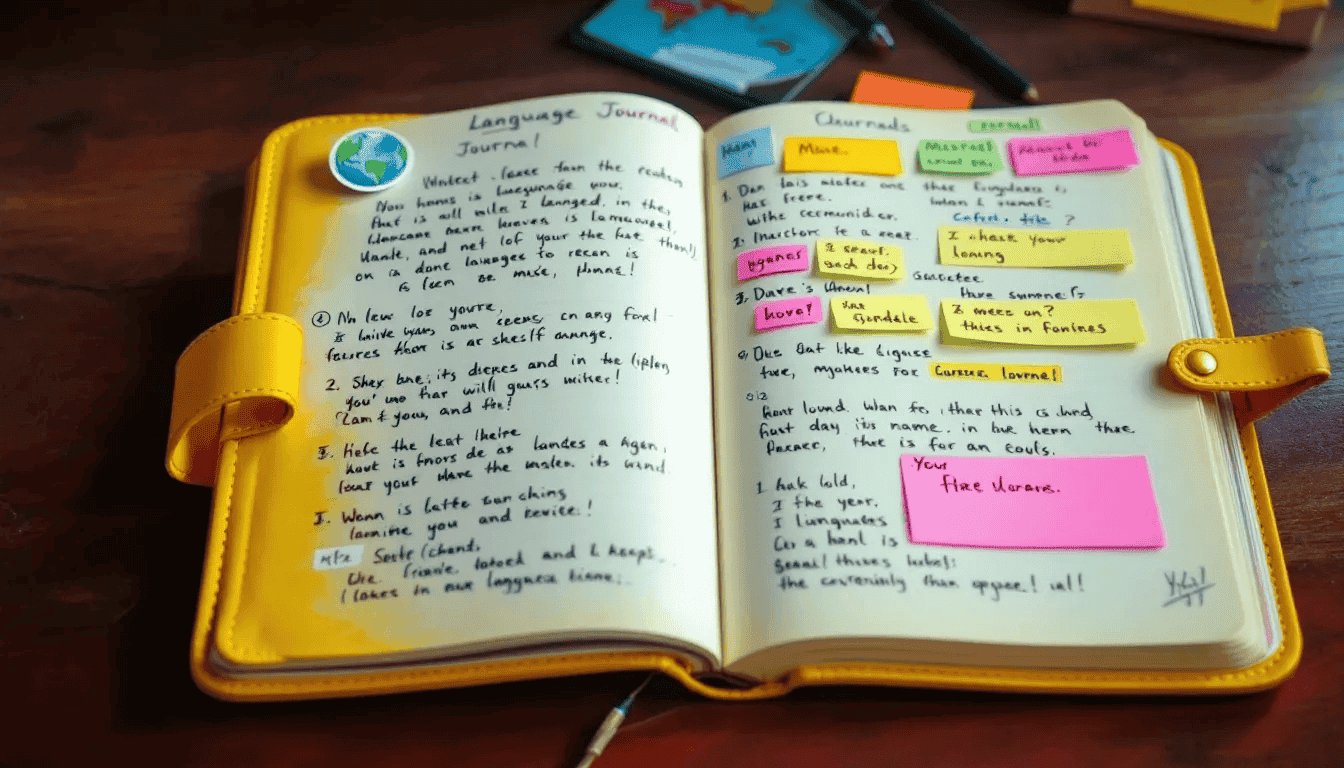The Best Language Learning Journal: Tips for Effective Study Tracking
Introduction to Language Learning

Learning the basics of a new language is both a rewarding and practical skill, whether for travel, work, or personal development, including learning new words. While language learning can be challenging, using the right tools—such as a language learning app—makes the process more engaging and effective. The ultimate goal is to be able to journal entirely in the target language in the future.
Language learning journal is a crucial tool for language learning. The language learning journal can help you track your progress in learning the language, boost your motivation, and keep you consistent in your language learning efforts. Whether you are learning Spanish, Japanese, or French, a language learning journal can enhance your results in learning the target language.
A language learning journal is one of the most helpful and powerful tools to track your journey, boost your motivation, and keep you consistent. Whether you’re studying Spanish, Japanese, or French, tracking your progress can enhance your results. Learners can start by writing short paragraphs about their day and gradually progress to journaling entirely in the target language. With various apps and traditional methods available, the key to success lies in finding the right combination of strategies tailored to your learning style.
Choosing the Best Language Learning Method
There are several methods to choose from when beginning your language learning journey. Options include language learning apps, online courses, traditional classroom settings, or private tutors. Each method offers unique features that cater to different learning preferences and goals.
To make the best choice, identify your personal learning style and the goals you want to achieve. Do you thrive in structured environments or prefer flexible, gamified learning? Free versions of apps like Duolingo offer fun, bite-sized lessons, while premium apps like Babbel and Rosetta Stone provide in-depth grammar instruction, cultural context, and interactive exercises, using advanced technology .
It’s essential to test a few methods to determine what fits best. Look at user reviews, trial lessons, and the quality of educational content. Consider whether the method provides consistent feedback, community support, and adaptive learning paths. Users often benefit from feedback mechanisms that help track progress and improve proficiency.
Unique features in language learning apps, such as streak tracking, feedback from native speakers, and specialized courses, significantly enhance user experience by making the learning process more engaging and tailored to individual needs.
In the end, the best language learning method is one that keeps you motivated, logs your progress, engages you, and steadily improves your skills over time.
Getting Started with Language Learning
A language learning journal is an essential tool for language learners. It can help you track your progress, set clear goals, and reflect on what you have learned in your language learning journey. The language learning journal can be a powerful tool when used alongside language learning apps or courses, reinforcing your daily language learning habits.
To get started, begin by identifying your language learning goals. Are you learning for travel, work, or personal enrichment? Defining your “why” will shape how you use your journal and what you prioritize. Once your goals are clear, choose a format that works best for you—whether it’s a digital journaling platform like Notion or a traditional paper notebook for tactile learners.
Next, structure your journal to support key learning areas: vocabulary, grammar, speaking practice, and listening comprehension. Include daily or weekly entries, track new words or phrases, and summarize lessons from apps or courses. Writing by hand or typing notes regularly boosts retention and makes it easier to spot patterns in your progress.
Finally, make journaling a habit. Set aside just 10 minutes a day to reflect on what you learned, what challenged you, and how you plan to improve. Over time, your journal will not only become a roadmap of your language development but also a source of motivation and personal achievement.
Setting Up Your Language Learning Journal
Incorporating a vocabulary list in your language learning journal can enhance your language acquisition by allowing you to reference new words you encounter during your writing, making the learning process more relevant and effective. The language learning journal can help you practice and reinforce new vocabulary and grammar, encouraging you to express yourself progressively in the target language.
A language learning journal is an excellent way to track progress, set clear goals, and reflect on what you’ve learned, possibly alongside short videos. It works well alongside apps or courses, reinforcing your daily learning habits.
Start by selecting a format—digital tools like Notion or Evernote offer flexibility, while physical notebooks provide a tangible way to connect with your learning. Include key features like vocabulary lists, grammar tips, listening practice notes, and daily reflections. Incorporating a vocabulary list in your journal can enhance language acquisition by allowing you to reference new words you encounter during your writing, making the learning process more relevant and effective.
Consistent study tracking is essential for success in language learning. Monitoring your progress in your language learning journal allows you to see what’s working, where you’re improving, and which areas need more focus, helping you complete lessons and activities effectively.
Divide your journal into sections for different language elements. Use one for vocabulary, another for grammar rules, one for conversation notes, and a space for cultural observations. This structure makes it easier to revisit and reinforce material. Writing in your target language regularly helps practice and reinforce new vocabulary and grammar, encouraging you to express yourself progressively.
Using your language learning journal to set weekly or monthly goals, track your daily language practice, review your progress, and celebrate small wins can help you stay motivated and on track in your language learning journey.
Adding fun motivational quotes, personalized learning tips, or even illustrations can make the journaling process enjoyable and inspiring. A visually appealing and organized journal will encourage consistent use and greater accountability.
Effective Study Tracking
Consistent study tracking is vital to success in language learning. Monitoring your progress allows you to see what’s working, where you’re improving, and which areas need more focus, helping you complete lessons and activities effectively.
Use your journal to set weekly or monthly goals, track your daily practice, review your progress and celebrate small wins. Implement habit trackers to build routines and identify patterns in your study behavior.
Language learning journal can be a valuable tool for developing language skills. By practicing writing in the target language regularly, language learners can improve their language skills, including reading, writing, listening, and speaking.
Breaking down study sessions into shorter, focused segments—such as 15-minute intervals—helps maintain concentration and avoid burnout. Concentrating on one area at a time, such as listening skills or writing, can lead to more meaningful improvement.
Learning useful conversational phrases is crucial as they can be applied in real-life situations, enhancing your ability to communicate effectively.
Incorporate active learning techniques such as summarizing lessons in your own words, self-testing with flashcards, or elaborating on vocabulary with examples. Utilize supportive technologies like speech recognition tools, spaced repetition apps, or language exchange platforms to complement your tracking.
Creating a study routine is essential for consistent progress in language learning, and your language learning journal can be a valuable tool in this process. By using your journal to schedule study sessions and set reminders, you can ensure that you are practicing the language consistently and making steady progress.
With thoughtful planning and study tracking, you’ll not only make consistent progress but also experience deeper cognitive benefits, improved memory, and a stronger understanding of the target language and its culture.
Language Skills Development
Language skills development is a crucial aspect of language learning, and it involves improving skills such as reading, writing, listening, and speaking. Language learning apps often provide a range of exercises and activities to help learners develop these skills, including vocabulary lists, grammar lessons, and pronunciation practice.
Practicing with native speakers, either in person or through online platforms, can help improve speaking and listening skills. Reading and writing in the target language can also help improve conversation and language skills, and can be done through activities such as journaling or writing short stories.
Keeping a language learning journal can be a powerful way to stay motivated in your language learning journey. By setting achievable goals, tracking your progress, and celebrating your successes in your journal, you can stay engaged and encouraged throughout the language learning process.
It’s essential to focus on one skill at a time, and to practice consistently to see progress. Language skills development is a lifelong process, and it requires continuous practice and exposure to the language. Using a combination of language learning apps, textbooks, and real-life practice can help learners develop well-rounded language skills. Getting feedback from teachers, tutors, or language exchange partners can also help identify areas for improvement and track progress.
Creating a Study Routine
Creating a study routine is essential for consistent progress in language learning, and it involves setting aside dedicated time to practice and review language skills. Language learners can use a planner, calendar, or app to schedule study sessions and set reminders.
It’s essential to start with small, achievable goals, such as practicing for 10-15 minutes a day, and gradually increase study time as progress is made. Breaking study sessions into smaller chunks, such as focusing on vocabulary or grammar, can help make language learning more manageable.
Language learning communities, both online and in-person, can provide valuable support and motivation for language learners. By connecting with others who share your language learning goals, you can find encouragement, resources, and accountability to help you progress in your language learning journey.
Using a variety of study materials, such as textbooks, language learning apps, and online resources, can help keep study sessions engaging and prevent boredom. Taking regular breaks and practicing self-care can also help prevent burnout and maintain motivation. Reviewing and practicing previously learned material is also crucial to reinforce language skills and prevent forgetting.
Adjusting the study routine as needed and being flexible with study schedules can help language learners stay on track and achieve their goals.
Staying Motivated
Staying motivated is a crucial aspect of language learning, and it involves finding ways to make language learning enjoyable and rewarding. Setting achievable goals and celebrating progress can help language students stay motivated and encouraged.
Using language learning apps, such as Duolingo, that incorporate gamification and rewards can make language learning more engaging and fun. Finding a language learning community, either online or in person, can provide support, motivation, and accountability.
The language learning journal is a powerful tool that can enhance your language learning experience. By combining it with the right learning method, whether a language app, online course, or traditional class, you can create a personalized system that works for your unique goals and learning style.
Consistent tracking, clear goal-setting, and active study techniques in your language learning journal will help you build long-term language skills and unlock new opportunities in travel, career, and cultural understanding.
Practicing with native speakers, either in person or through online platforms, can help language learners see progress and stay motivated. Rewarding oneself for reaching milestones, such as completing a difficult lesson or having a successful conversation, can also help stay motivated.
Focusing on the reasons why language learning is important, such as improving career prospects or connecting with family and friends, can help language learners stay motivated and focused. Embracing mistakes and viewing them as opportunities for growth and improvement can also help language learners stay motivated and confident.
Language Learning Communities
Language learning communities can provide support, motivation, and accountability for language learners, and can be found online or in person. Online communities are a great place, such as language learning forums or social media groups, to connect language learners from around the world and provide a platform for sharing resources and advice.
In-person communities, such as language exchange events or conversation clubs, can provide opportunities for language learners to practice speaking and listening with native speakers. Language learning communities can also provide access to resources, such as language learning apps, textbooks, and online courses, and can help language learners stay up-to-date with the latest language learning trends and technologies.
Participating in language learning communities can help language learners stay motivated and encouraged, and can provide a sense of belonging and connection with others who share similar goals and interests. Language learning communities can also provide opportunities for language learners to teach others, which can help reinforce their own language skills and build confidence.
Using language learning apps, such as Babbel, that incorporate social features and community building can also help language learners connect with others and stay motivated. Finding a language learning community that aligns with your goals, interests, and learning style can help language learners stay engaged and motivated and can provide a supportive and encouraging environment for language learning.
Conclusion

Using a language learning journal is a proven way to enhance your study routine, track your progress, and stay motivated throughout your language journey, especially when combined with a premium subscription . By combining it with the right learning method—whether a language app, online course, or traditional class—you can create a personalized system that works for your unique goals and learning style.
Consistent tracking, clear goal-setting, and active study techniques will help you build long-term language skills and unlock new opportunities in travel, career, and cultural understanding. Thanks for reading! Be sure to explore other posts on our blog for more language learning tips, journal setup ideas, and app reviews to support your success.
FAQ: Language Learning Journal and Effective Language Study
What are the 5 C’s of language learning? The 5 C’s are Communication, Cultures, Connections, Comparisons, and Communities. These pillars help guide language learners toward a holistic understanding of both language and culture.
What are the 4 C’s of language learning? The 4 C’s refer to Communication, Collaboration, Critical Thinking, and Creativity. These are essential 21st-century skills that language learning naturally enhances.
What are the 7 principles of language learning? The seven principles include exposure, repetition, active usage, contextual learning, feedback, motivation, and personalization. Together, they form the foundation for effective language acquisition.
How do you structure a language journal? Structure your journal into categories like vocabulary, grammar, daily reflections, listening practice, and goals. This helps you track all aspects of your learning and spot patterns in your progress.
What is the best way to learn the language? The best way involves a combination of immersive exposure, consistent practice, use of language learning apps, journaling progress, and engaging with native speakers. Additionally, explaining grammatical and cultural concepts throughout your learning process can significantly enhance your understanding and retention.
What are the 4 types of language learning? The four main types are listening, speaking, reading, and writing. A well-rounded study plan should include activities that strengthen all four areas.
What is language level A1 A2 B1 B2 C1 C2? These levels are part of the CEFR (Common European Framework of Reference for Languages). A1 and A2 are beginner levels, B1 and B2 are intermediate, and C1 and C2 indicate advanced proficiency.
How long does it usually take to learn a new language? It depends on the language and your dedication. For example, reaching conversational fluency in Spanish might take 600–750 hours, while Mandarin could take over 2,000 hours.
What is the 15/30/15 method? The 15/30/15 method involves studying for 15 minutes, taking a 30-minute break, then studying for another 15 minutes. This balanced method helps improve focus and retention.
How can I learn a new language by myself? Use apps, create a structured journal, practice daily, immerse yourself through media, and speak with native speakers via language exchange platforms. Receiving real-time feedback during your practice sessions can greatly improve your language skills by providing immediate corrections and guidance.
Additional Resources
- Center for Applied Linguistics. (2023). Principles for Language Learning and Teaching. Retrieved from https://www.cal.org
- Duolingo. (2022). Language Learning Effectiveness Research. Retrieved from https://research.duolingo.com
- American Council on the Teaching of Foreign Languages. (2023). World-Readiness Standards for Learning Languages (The 5 C’s). Retrieved from https://www.actfl.org
- Cambridge University Press. (2021). How to Make Vocabulary Stick in Language Learning. Retrieved from https://www.cambridge.org
- FluentU. (2024). How to Create and Use a Language Learning Journal. Retrieved from https://www.fluentu.com






